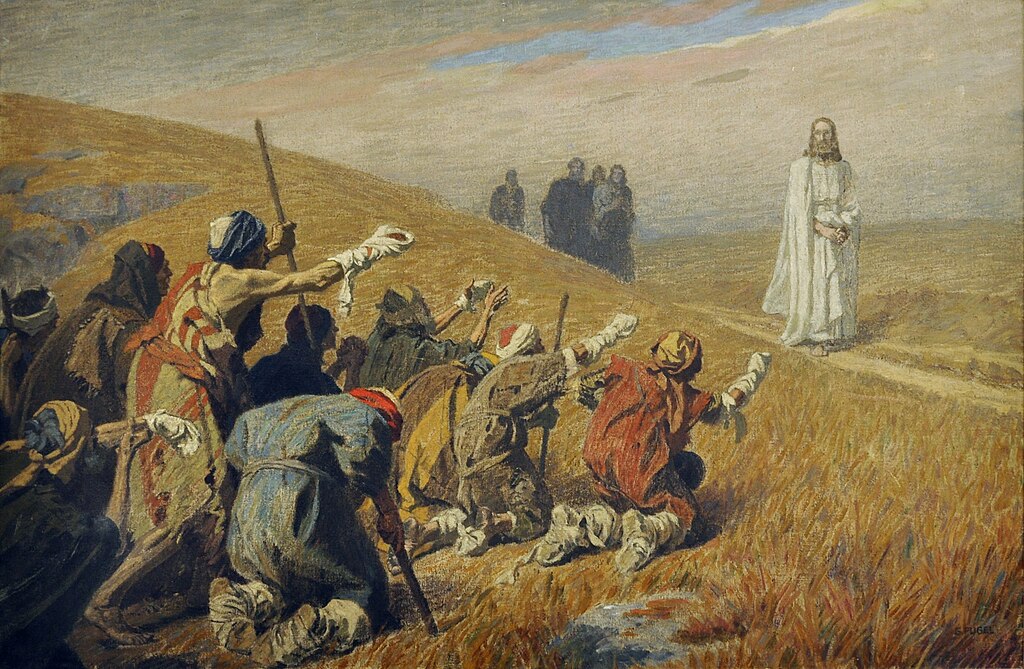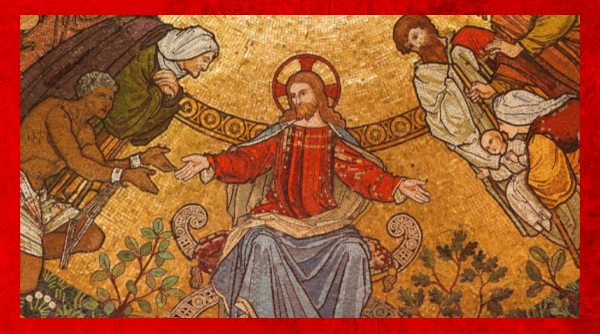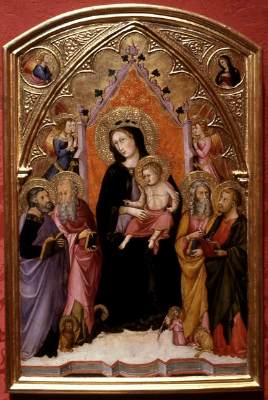Outliers

As he continued his journey to Jerusalem, he traveled through Samaria and Galilee. As he was entering a village, ten lepers met him. They stood at a distance from him and raised their voice, saying, “Jesus, Master! Have pity on us!” And when he saw them, he said, “Go show yourselves to the priests.” As they were going they were cleansed. And one of them, realizing he had been healed, returned, glorifying God in a loud voice; and he fell at the feet of Jesus and thanked him. He was a Samaritan. Jesus said in reply, “Ten were cleansed, were they not? Where are the other nine? Has none but this foreigner returned to give thanks to God?” Then he said to him, “Stand up and go; your faith has saved you.” (Luke 17:11-19)
In the secular world, people are characterized as outliers in many ways. Not too long ago, a well-funded and orchestrated protest against the one-percenters of the ultra-high wealthy took place as Occupy Wallstreet. In the world of science and education, the outliers are those with the ultra-high IQ. In this Gospel which we recently heard in mass, Jesus is calling us to belong to a different group of outliers: those who truly love Him.
The lepers knew who Jesus was and even referred to Him as master. Living apart as commanded due to their disease, we don’t know how or what they learned about Jesus. But they believed Him to be a miracle worker.
They don’t tell Him what miracle to render; they don’t need to. He knows their trial. They simply ask for pity, meaning some sort of action that would come forth from His pity. Hearing Him say, “Go show yourselves to the priests”, they understood the purpose of this was to present to the priests their clean leprosy-free body (Leviticus 14). As their separation from society implies, they would have already presented themselves to a priest and been confirmed with disease. The only reason for them to present themselves to a priest again would be if the disease had left. So this means that, between their departure from Jesus and their arrival to the priest, their condition would change.
They must have left quickly in anticipation of receiving this miraculous healing, one which would save them physically as well as spiritually by their re-incorporation into God’s people. Did they leave out of obedience to Him, or was it out of selfishness? What if He had given them a different command that did not imply the promise of a miracle…how would they have responded to Him?
At some point the miracle occurs. What happens next is a manifestation of the disposition of their heart. Nine wanted only the miracle—the gift—not the One who gives them their societal life back, for they did not return to Him. St. Ignatius of Loyola profiles for us the stages of a soul growing in humility and love of God. Those attached to His gifts are the lowest ‘class of men’. They want to enjoy life without burdens (that of leprosy in this scripture) solely for their own sake. The second class of men, whose salvation is perhaps more perilous than this first class, seeks control rather than relief. For them, God is a useful instrument to a desired end…was this how they viewed Jesus? These nine lepers seem to belong to one of these two states of heart.
The third class of men—the outliers–only want what God wants. Their heart is surrendered to Him and so are able to receive His love most fully. When miracles are received, they are so in awe of God’s love and majesty that, in that moment, they are indifferent to all else including their own thinking and preferences. Their heart swells in gratitude so much that they must turn to Him with love or they feel they might burst. It is a response from deep within the soul. While his nine companions were simply glad to be free of leprosy, this one leper can do nothing but return love for love.
The Church, handing down the teachings of the saints, explains stages of growth in love of God through which a soul passes. Our lepers seem to have a basic faith, at least a belief in God and His action, since they asked Jesus for pity. Assuming these nine lepers were free of mortal sin, they are stuck in the stage of purging their self-centeredness and pride (for it is quite arrogant to take a gift and run with it without giving a thank you to the Giver first).
In the second stage of spiritual growth (illumination), the soul is solidly seeking God and desires to love Him by obeying His will. Doing so requires overcoming attachment to oneself, one’s own thinking, preferences, and attitudes. This person is in that third class of men. They are growing in what St. Ignatius refers to as degrees of humility. At first, they want to never sin again and to just do His will. Then they grow into the second degree of humility in which they want to do more than obey Him; they want to love Him in every conscious thought. The more they deny themselves and lovingly humble themselves to Him, the more He illuminates their soul with understanding and wisdom. They experience His love at a progressively deeper pace as their soul is transformed. It could all take place in a moment but usually it is throughout a lifetime, for it is in the process of our transformation that God builds relationship with us.
Returning to the miracle, the leper is heading to the priest as instructed and then receives the miracle: he is cleansed of all disease. A soul in this first degree of humility may have continued to the priest out of true and selfless love for Jesus, as an act of love for Him, and return to Jesus thereafter. But our leper didn’t continue on task. Overwhelmed by the fact that God loves him so personally such as to give him this healing, the leper immediately returns in thanksgiving to Jesus. It is the nature of love that, once received, it must be shared. The soul of this leper was humbly disposed to receive God’s love of a miracle (as a miracle itself is an act of love) such that it brought the leper back to love Himself.
Yes, Jesus is calling us to belong to a different group of outliers: those who truly love Him.
May Your grace, oh Lord we pray, at all times go before us and follow after, and make us always determined to carry out good works. Amen. (Collect prayers of the mass)
Ad Majorem Dei Gloriam 😊
(Image by Gebhard Fugel, Public domain, via Wikimedia Commons)

Thank you for caring and sharing appropriately...
Consecrated to the Sacred Heart of Jesus through the Immaculate Heart of Mary. Except where noted, all design, writing and images ©2024 by Debra Black and TheFaceofGraceProject.com. All Rights Reserved. No part of this website may be reproduced, distributed or transmitted in any form or by any means, including downloading, photocopying, recording, or other electronic or mechanical methods, without the prior written permission of the publisher, except in the case of brief quotations embodied in critical reviews and certain other noncommercial uses permitted by copyright law. For permission or to report violations please email: thefaceofgraceproject@gmail.com
